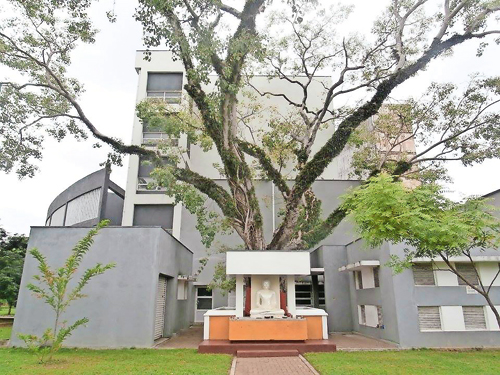News
National Archives young DG target of controversy over Dutch records
 The Department of National Archives is embroiled in controversy over allegations that copies of historical Dutch records in the custody of the institution have been sold to outsiders.
The Department of National Archives is embroiled in controversy over allegations that copies of historical Dutch records in the custody of the institution have been sold to outsiders.
The accusations mostly target the Department’s Director General, Nadeera Rupesinghe, a young historian educated in the Netherlands, who senior staff insist has been tirelessly streamlining and modernising the institution. A three-member committee appointed by the Cultural Affairs Ministry earlier last year to investigate the claims—first made in 2018 by three employees of the same Department—found no evidence of malpractice.
The Criminal Investigation Department (CID) and the Commission to Investigation Allegations of Bribery and Corruption have also inquired, taking lengthy statements from Dr Rupesinghe and other staff, as well as written representation.
But yet another committee has now been appointed, this time sanctioned by Cabinet, to investigate the allegations. Meanwhile, moves are afoot to remove Dr Rupesinghe—against whom no proof of wrongdoing has been found—via a Cabinet paper from Prime Minister Mahinda Rajapaksa’s office, in his capacity as Cultural Affairs Minister.
“There is an inquiry by a Cabinet-appointed committee,” said Prof Kapila Gunawardena, Secretary to the Ministry Cultural Affairs. “Only after that will we get to know what’s wrong. Whether or not the Director General will be removed depends on the inquiry.”
Now, other employees of the Department of National Archives have written impassioned letters to the Ministry defending the Director General and lamenting that the accusations reflect badly on all of them. Not only does it affect public confidence in the Department, it has eroded trust in the workforce and caused them to be labelled, without proof, as “those people from the office that sells documents”.
The allegations have been levelled against Dr Rupesinghe despite the Dutch records being “open documents” and not classified in any way. The National Archives of Sri Lanka keeps 310 metres of Dutch records created by the Verenigde Oost-Indische Compagnie or VOC, the Dutch East-India Company, on Ceylon. Sri Lankans are most familiar with the Tombos or registers of landholdings.
The Dutch Government has in the past assisted the National Archives with preserving these unique documents. One such instance was the now-concluded Dutch Records Project to improve the condition of and accessibility to these Tombos and other documents.
Dr Rupesinghe has received the backing of academics, researchers and practitioners who have benefited from the changes she introduced at the National Archives. For instance, she drafted a legal deposit law to replace the archaic law from 1885 that is the oldest in the world, thereby upgrading the legislation to address modern-day needs. She also planned the cleaning, repackaging and re-boxing of extensive archival collections into acid-free boxes.
In December last year, 45 of them signed a letter to President Gotabaya Rajapaksa, Prime Minister Rajapaksa and the Cultural Affairs Ministry Secretary condemning attempts to remove her on unsubstantiated allegations.
“It is nigh on impossible to strengthen and improve institutions if Government officials remove competent professionals, and if the same officials further intervene—with very little technical knowledge—to suspend urgent and time-sensitive work, particularly with projects developed to preserves centuries-old records.”
In early 2018, three employees (all of them Assistant Archivists) wrote to the Ministry alleging that Dr Rupesinghe allowed two Dutch nationals named Frans van Diyk and Lidwien Jansen entry into the repository containing Dutch records for around ten days. They claimed they changed the numbering of some documents, took photographs and used their computers in the repository.
It has been found, however, that the Dutch officials—both expert Archivists from the Netherlands National Archives—were there to make a checklist and to conduct a preliminary survey for a proposed larger digitisation initiative to combine the Sri Lankan National Archives’ three inventories of Dutch records into one in line with international standards.
The officials were part of the Dutch Government-backed ‘Shared Cultural Heritage’ project and Mr van Diyk has worked with Sri Lanka previously. The number of days spent at the National Archives in 2018 was six, not ten.
The Netherlands National Archives has had a longstanding relationship with the Sri Lanka National Archives—since the 1930s, in particular, with regards to Dutch records. Between 2010 and 2013, two academics from the Dutch University of Utrecht and Radboud University digitised the Dutch Tombos. One of them, Dr Albert van den Belt, and his local assistants were even granted a separate office by a previous Director General in view of the importance of their work.
Despite replying to each accusation in detail, a Battaramulla-based organisation named the Buddhist Information Centre last year renewed the campaign against Dr Rupesinghe, saying she released copies of historical documents—many of which are already in the Netherlands in microfilm—without authority to Dutch nationals.
“Additionally, the Director General has been getting limitless Tombos and Dutch documents to her room and allowing foreigners to take copies of them,” claims Ven Angulugalle Siri Jinananda Thera. “She also opens the office during the early and late hours, engaging in secretive activity.” No evidence has, however, been provided.
“It can in no way be accepted by the management that classified documents stored using transparent and secure measures in secret rooms are being taken out,” says a letter written in March this year by employees of National Archives to the Ministry Secretary. “All employees of this Department are bound by the Code of Ethics of the International Council on Archives to provide their services.”
“One very serious outcome has been that the officers off this Department are now extremely scared to do anything with these documents,” it says, adding that officers are reluctant to conduct their duties in case this attracts allegations against them.

